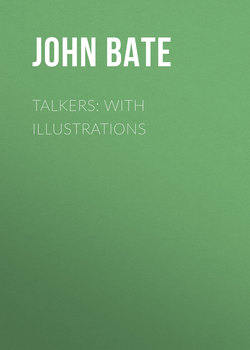Читать книгу Talkers: With Illustrations - John Bate, John Bate - Страница 5
IV.
THE BRAWLER
Оглавление“As empty vessels make the loudest sound, so they that have the least wit are the loudest babblers.”
– Plato.
This is a Talker whose characteristic consists in the possession of sound lungs and sonorous voice. He is particularly jealous of their failure, and hence, as a means of their preservation, he keeps them in good exercise. “Practice makes perfect;” and believing in this maxim, he uses his vocal functions without squeamish regard to the possibility of their decline. One would imagine from the volume and strength of tongue-power put forth in his conversation that he considered his hearers stone deaf. He does not in fact talk but proclaim. I doubt not that he is sometimes guilty of this outrage from vanity, because he thinks what he has to say is of such vast importance; or he has his own person in such veneration, that he believes nothing which concerns him can be insignificant to anybody else. I do not wonder that some people have had the drum of their ears seriously affected by his brawling. Nor is it surprising that old maids have been thrown into hysterics, and little children scared out of their wits by his vociferousness. Nor should it be set down as a thing extraordinary that strong-nerved men have found it expedient to insist either upon a reduction of the wind in the organ, or a stoppage of the instrument altogether, or a hasty exit of their persons from his presence.
As a preventive of these calamities in the future, and as a means of restoring this unfortunate talker into his proper position in the ranks of modern polite and intelligent society, I have been led to search in my books for a cure of his fault, and I have discovered the following in the Spectator: —
“… Plutarch tells us that Caius Gracchus, the Roman, was frequently hurried by his passions into so loud and tumultuous a way of speaking, and so strained his voice as not to be able to proceed. To remedy this excess, he had an ingenious servant, by name Licinius, always attending him with a pitch-pipe, or instrument to regulate the voice; who, whenever he heard his master begin to be high, immediately touched a soft note, at which, ’tis said, Caius would presently abate and grow calm.
“Upon recollecting this story, I have frequently wondered that this useful instrument should have been so long discontinued, especially since we find that this good office of Licinius has preserved his memory for many hundred years, which, methinks, should have encouraged some one to revive it, if not for the public good, yet for his own credit. It may be objected that our loud talkers are so fond of their own noise that they would not take it well to be checked by their servants. But granting this to be true, surely any of their hearers have a very good title to play a soft note in their own defence. To be short, no Licinius appearing, and the noise increasing, I was resolved to give this late long vacation to the good of my country; and I have at length, by the assistance of an ingenious artist (who works for the Royal Society), almost completed my design, and shall be ready in a short time to furnish the public with what number of these instruments they please, either to lodge at coffee-houses, or carry for their own private use. In the meantime I shall pay that respect to several gentlemen, who I know will be in danger of offending against this instrument, to give them notice of it by private letters, in which I shall only write, ‘Get a Licinius.’
“I had almost forgotten to inform you that as an improvement in this instrument, there will be a particular note, which I shall call a hush-note; and that is to be made use of against a long story, swearing, obsceneness, and the like.”
